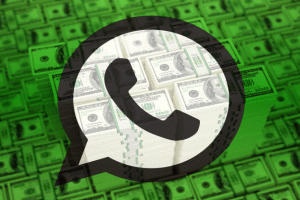WhatsApp was warned over user data: Now it's sued for 'illegal' Facebook sharing
 Germany's consumer watchdogs have made good on their legal threat against Facebook's WhatsApp, suing the messaging giant over the user data it transmits to its social-networking mothership.
Germany's consumer watchdogs have made good on their legal threat against Facebook's WhatsApp, suing the messaging giant over the user data it transmits to its social-networking mothership.
The Federation of German Consumer Organisations (VZBV) asked the Berlin county court for an injunction to stop the data-sharing, and to ensure that Facebook deletes the data that WhatsApp has already given it. The VZBV accused the companies of abusing users' trust. The move follows Facebook's failure to agree to a cease-and-desist request that the VZBV issued in September last year, a month after Facebook changed WhatsApp's terms to allow the data-sharing.
Read moreWhatsApp and Telegram accounts could be hijacked by sending malware-laced images
 Today, researchers at Check Point Security announced a new attack against WhatsApp and Telegram, targeting the way both chat services process images and multimedia files.
Today, researchers at Check Point Security announced a new attack against WhatsApp and Telegram, targeting the way both chat services process images and multimedia files.
In the WhatsApp case, Check Point was able to craft a malicious image that would appear normal in preview, but direct users to a malware-laden HTML page. Once loaded, the page will retrieve all locally stored data, enabling attackers to effectively hijack the user’s account. The vulnerability was reported to both services on March 8th, and both have changed their file upload validation protocols to protect against the attack.
Read moreBeware new WhatsApp scam offering free internet without Wi-Fi
 A pretty dumb WhatsApp scam is making rounds in chain mail form, promising "free internet" without Wi-Fi on an invite-only basis. First of all, the scam is quite dumb to begin with because the only way to use WhatsApp without Wi-Fi is to have a cellular data connection and WhatsApp cannot offer data - it's just an app, not a provider.
A pretty dumb WhatsApp scam is making rounds in chain mail form, promising "free internet" without Wi-Fi on an invite-only basis. First of all, the scam is quite dumb to begin with because the only way to use WhatsApp without Wi-Fi is to have a cellular data connection and WhatsApp cannot offer data - it's just an app, not a provider.
Secondly, the scam is spreading because it prompts victims to forward the message to 13 friends or five groups on WhatsApp to activate the "free internet." As usual, the message spreads via WhatsApp groups or comes from a friend who 'recommends' the service - often unaware of it. In this case, you receive a special invitation with a link.
Read moreFacebook told to stop exploiting WhatsApp data during EU probe
 European Union privacy chiefs said Facebook Inc. must stop processing user data from its WhatsApp messaging service while they are investigating the privacy policy changes the company announced in August.
European Union privacy chiefs said Facebook Inc. must stop processing user data from its WhatsApp messaging service while they are investigating the privacy policy changes the company announced in August.
The Article 29 Working Party, made up of privacy chiefs from across the 28-nation EU, told Facebook it had “serious concerns” about the sharing of WhatsApp users’ data for purposes that were not included in the terms of service and privacy policy when existing users signed up to the service. European privacy watchdogs don’t shy away from targeting big US technology firms, as previous probes into Facebook, Alphabet Inc.’s Google or Microsoft Corp. have shown.
Read moreHow to stop WhatsApp from sharing your data with Facebook
 For the first time in four years and since being acquired by Facebook, WhatsApp is updating its terms and conditions, as well as its privacy policy.
For the first time in four years and since being acquired by Facebook, WhatsApp is updating its terms and conditions, as well as its privacy policy.
Part of this update includes WhatsApp sharing your account information with Facebook to, among other things, provide better targeted ads. What information is being shared with Facebook? The updated WhatsApp FAQ page says that the phone number you used to sign up for WhatsApp with will be shared, as well as the last time you used the service. Facebook will not be able to see your messages, photos or other media you share. And any information will not be publicly visible to anyone using Facebook.
Read moreSkype, WhatsApp, and Yelp access your data hundreds of times
 Skype, WhatsApp, and Yelp have accessed my contacts list data thousands and times, and none of the companies are sure why.
Skype, WhatsApp, and Yelp have accessed my contacts list data thousands and times, and none of the companies are sure why.
The companies -- Microsoft, which owns Skype; and Facebook, which owns WhatsApp; and Yelp -- were all unable to explain why their apps had accessed the contacts list in my Android phone so often. BlackBerry's Priv, the smartphone maker's debut Android phone running "Lollipop" 5.1.1, comes with an app, dubbed DTEK, which monitors and notifies users when data has been accessed, when, and for how long, including a user's location, contacts, text messages, camera, and microphone.
Read moreWhatsApp for Web vulnerability could give hackers control over computers
 Users of WhatsApp for Web could easily have their security and devices compromised, security researchers have claimed. The web interface has a security issue that lets hackers take over computers using just a phone number and a simple message.
Users of WhatsApp for Web could easily have their security and devices compromised, security researchers have claimed. The web interface has a security issue that lets hackers take over computers using just a phone number and a simple message.
All of the users could be vulnerable to the exploit, according to the security firm. Hackers would just send them a small, apparently innocent contacts file — which, when opened, would allow hackers to run malicious code and leave them open to being hit by code that could take control of their computer, watching what they are doing, or use it to spread viruses.
Read moreWhatsApp sees increasing complexity of spam campaigns
 Over the past few months, AdaptiveMobile has tracked an increase of spam complexity on messaging apps, such as WhatsApp, in the United States, Europe and India, and expects these attacks to continue through 2015.
Over the past few months, AdaptiveMobile has tracked an increase of spam complexity on messaging apps, such as WhatsApp, in the United States, Europe and India, and expects these attacks to continue through 2015.
These campaigns have methodologies and content similar to SMS messaging abuse threats, providing evidence that the criminal groups are now also targeting messaging apps as service providers have succeeded in reducing levels of SMS spam. In particular, criminals are using WhatsApp to target users with text spam. Recent campaigns targeting WhatsApp users include investment spam messages sent from United States numbers to Europe.
11 Unsecure Mobile and Internet Messaging Apps
 In the face of widespread Internet surveillance, we need a secure and practical means of talking to each other from our phones and computers. For years, privacy and security experts worldwide have called on the general public to adopt strong, open-source cryptography to protect our communications.
In the face of widespread Internet surveillance, we need a secure and practical means of talking to each other from our phones and computers. For years, privacy and security experts worldwide have called on the general public to adopt strong, open-source cryptography to protect our communications.
Many companies offer “secure messaging” products — but are these systems actually secure? The Electronic Frontier Foundation’s secure messaging scorecard made a list of mobile and Internet messaging services that scored well on privacy and security and the services that scored poorly. Let’s focus primarily on the most popular messengers.
Read moreWhatsApp’s first half Of 2014 revenue was $15M
 As you know, Mark Zuckerberg acquired messenger WhatsApp less than a year ago. Not so long ago, Facebook unveiled financial results for the third quarter of 2014. According to the document, WhatsApp income in 2013 was $ 10 million, but the loss amounted service catastrophic amount in comparison.
As you know, Mark Zuckerberg acquired messenger WhatsApp less than a year ago. Not so long ago, Facebook unveiled financial results for the third quarter of 2014. According to the document, WhatsApp income in 2013 was $ 10 million, but the loss amounted service catastrophic amount in comparison.
Do not forget that we are talking about one of the most popular messengers in the world. Facebook disclosed financials of its acquisition of WhatsApp for the first time. Essentially, due to WhatsApp’s quickly rising valuation, it used share-based compensation to attract top talent. Eventually, the acquisition by Facebook would largely make the “expenses” of issuing that stock moot.
Read moreAxarhöfði 14,
110 Reykjavik, Iceland















